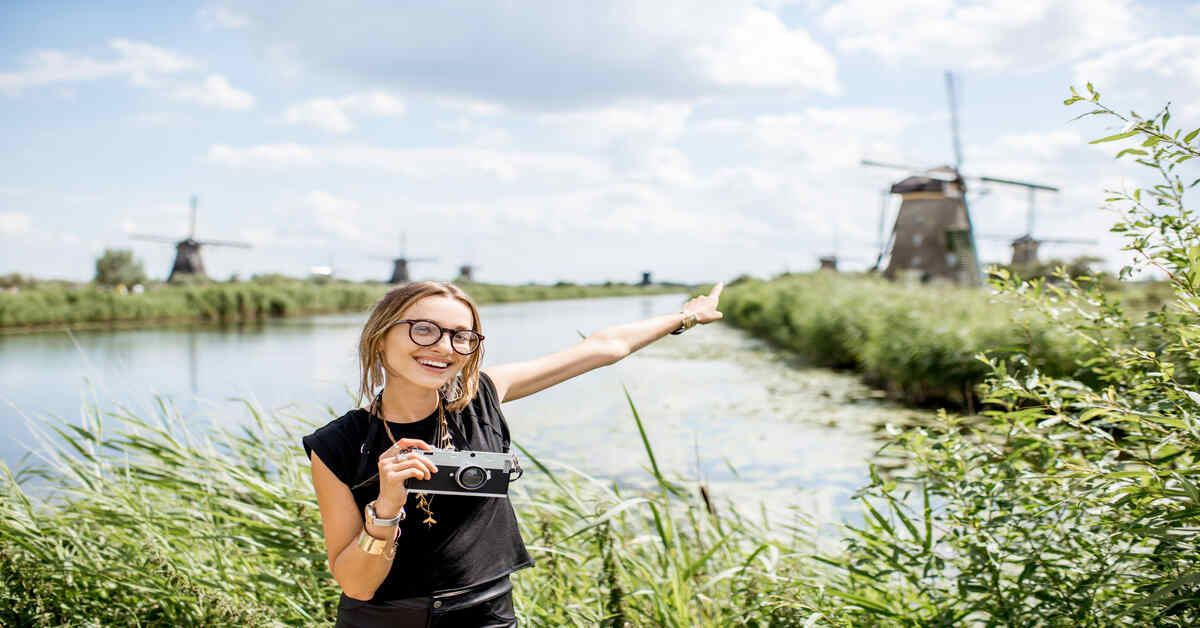
The Netherlands is a land of scenic canals, old towns and tulip fields, however, it is also leading the sustainability in the world. Visiting Holland, people usually fall in love not only with the charm of the country but with the way in which it is environmentally responsible and modern at the same time. Sustainable travel in the Netherlands is not about doing without any comfort; it is about seeing the country in a conscious way to be able to maintain all its natural and cultural beauty and make it available to the next generations. Sustainable accommodation, zero-waste, eco-friendly, bicycle trips, and more: Sustainable travel in the Netherlands will enable you to have an adventure and also contribute to the environment.
Sustainable travel in the Netherlands is a lifestyle that is highly recognizable to Dutch culture. Geography of the country 30 percent of it is under sea level, thus, turning the Dutch into the innovators of environmental innovation and resource management. This knowledge is transferred to the tourism sector whereby the tourists are advised to make a conscious decision that benefits the local communities and limits the carbon footprint.
Travelling smart in the Netherlands is sustainable: visiting local businesses, using the public transport or bicycles, staying at ecologically certified hotels, and respecting the fragile nature of nature that the country is special. It is a joint venture involving both locals and foreigners to ensure that there is a balance between development and conservation.
Dutch life is centred on cycling. The Netherlands is the bicycle-friendly nation of the world by the number of bike paths, which are more than 35,000 km. Driving is not the best course of action; Dutch cycling culture via rentals minimizes emissions while exploring local life. You will see lanes and parking lots that are devoted to the cyclists and even the traffic lights.
The cities of the Netherlands are quickly becoming electric in their public transport. Renewable energy is used in trains, trams, and buses and traveling between cities is convenient and environmentally-friendly. Think about buying an OV-chipkaart to travel on a sustainable basis.
For longer trips, electric car rentals or car-sharing platforms like Greenwheels are excellent sustainable travel Netherlands options. Charging stations are abundant across highways and cities, ensuring smooth eco-travel from Amsterdam to Groningen.
Green hospitality has been taken up by the Netherlands with great passion. Several accommodations have been certified such as Green Key or EU Ecolabel and they are now acknowledged as dedicated to their energy consumption, recycling, and use of the food produced locally.
These eco-friendly choices let you rest easy knowing your stay contributes positively to the environment.
Food is considered a critical aspect in sustainable travel in the Netherlands. Farm-to-table, plant-based diets and food waste reduction initiatives are being adopted by the Dutch. Numerous restaurants do work with the local farmers to obtain organic products to minimize transport emissions.
When eating out, look for labels like “Biologisch” (organic) and “Fairtrade”, or choose local street markets for fresh Dutch produce such as cheese, bread, and vegetables.
Sustainability does not only concern the environment, but it is also about maintaining culture and empowerment of the locals. By purchasing crafts made by locals, visiting local markets, or going on tours led by locals, you also invest directly into the community’s well-being.
You may want to visit some of the less-known areas in the country such as Friesland, Drenthe and Gelderland which are known to host the craftsmen, farmers and inns owned by families. This decentralizes the tourism of the busy centers such as Amsterdam and all tourists in the country benefit.
The Netherlands boasts over 20 national parks featuring wetlands, forests, and dunes. Visit Hoge Veluwe National Park, where cycling trails wind through heathlands and museums like the Kröller-Müller house world-class art.
Located in Flevoland, this vast wetland reserve is a haven for migratory birds, deer, and wild horses, perfect for eco-tourists and photographers.
Enjoy the waterways without harming ecosystems. Choose electric or paddle-powered boats and follow eco-tourism guidelines to keep Dutch canals pristine.
Cities like Rotterdam and Utrecht are pioneers in sustainable architecture and urban farming. Rooftop gardens, solar-powered buildings, and vertical farms offer a glimpse into the Netherlands’ eco-future.
Instead of mass-produced souvenirs, choose sustainable keepsakes that tell a story: handmade pottery from Delft, recycled art pieces, organic Dutch chocolates, or locally made soaps and textiles. These gifts not only reduce waste but also support ethical craftsmanship.
1: Is it easy to travel sustainably in smaller Dutch towns?
Yes, absolutely. Most small cities also have bicycle rentals, sustainable hotels, and transport access. Sustainable infrastructure is an active support of the Dutch government even in the rural regions, which is why it is easy to adhere to environmentally friendly habits during your trip.
2: Are sustainable hotels more expensive than regular ones?
Not necessarily. People can find lots of eco-hotels in the Netherlands at competitive rates, and some of them can even contribute to saving money, providing such services as free bikes or local food for breakfast. Sustainability simply means making better choices, which include quality, comfort, and a positive change.
Sustainable travel in the Netherlands is not a fad at all, but a means to get to know the country even better. The Dutch have demonstrated that innovation, respect to nature and modern living can exist in perfect harmony. By deciding to travel in a sustainable manner, you become a member of such harmony.
Whether it is riding along the tracks full of windmills or eating farm fresh food, every decision you make helps keep the landscapes and ways of life that make Holland special. Therefore, light pack, be mindful and have the green heart of the Netherlands encourage you to go out and see the world not as a visitor but as a sustainable guest.
Leave A Comment